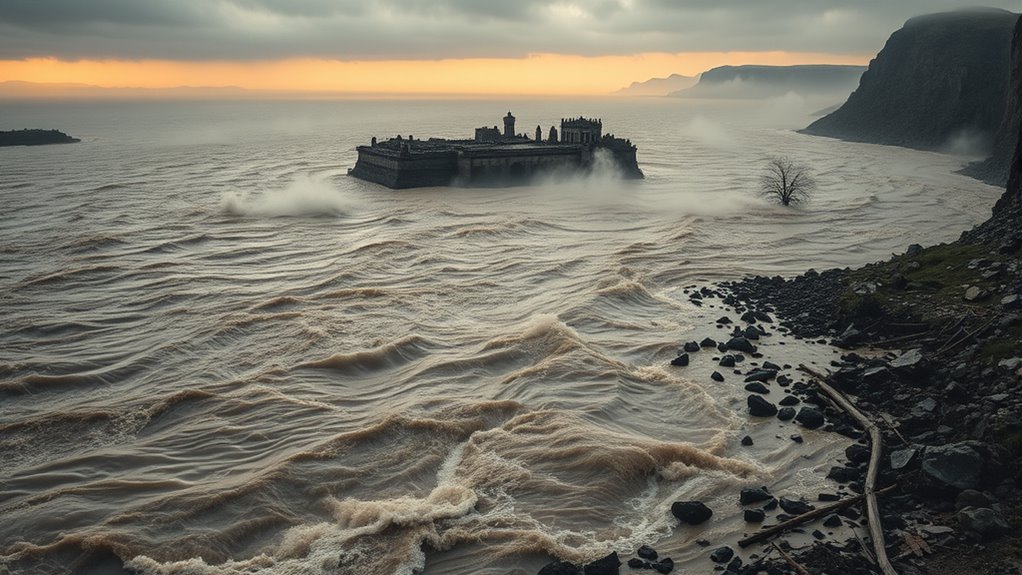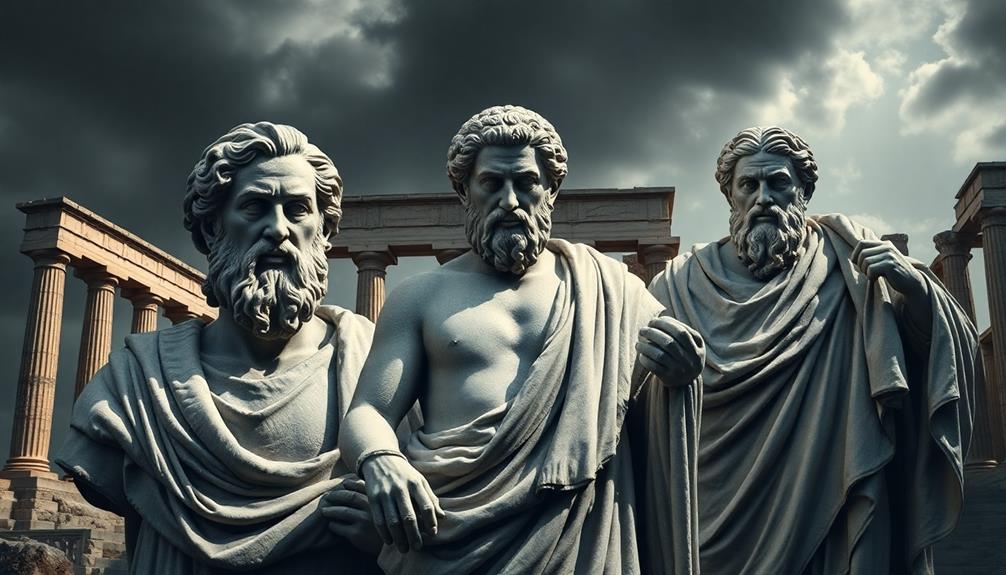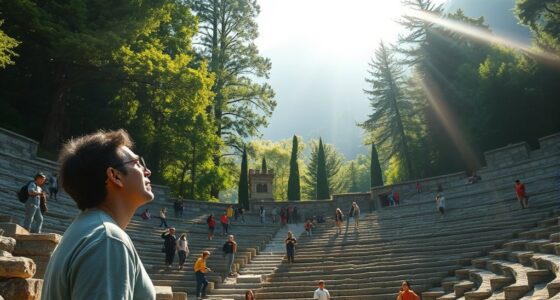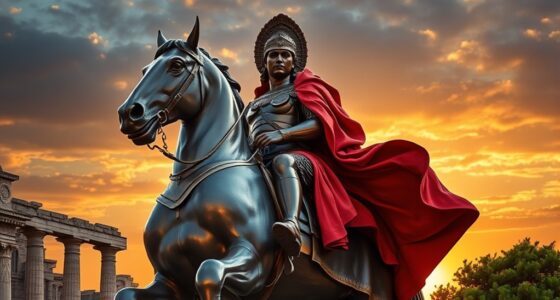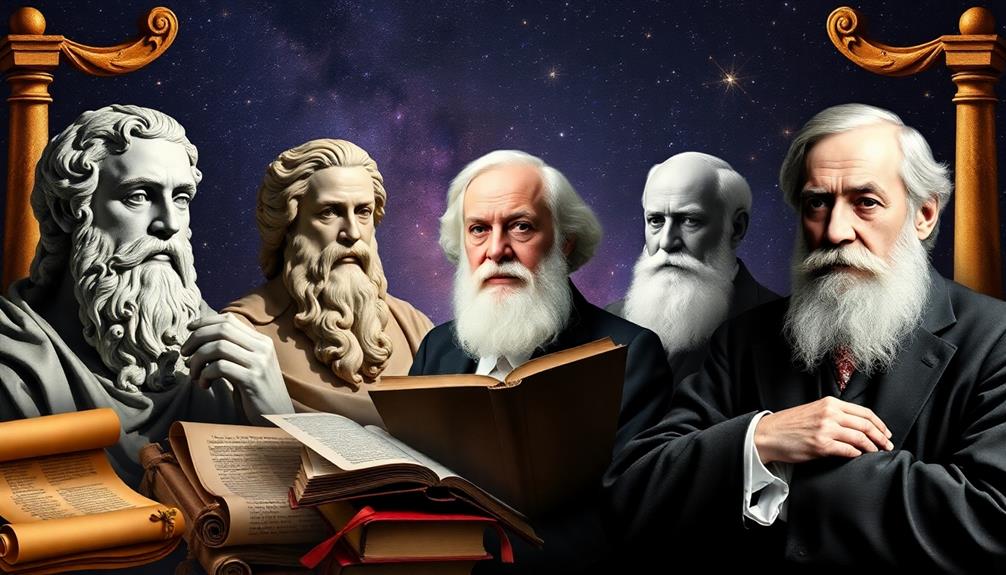Deucalion’s flood myth blends ancient storytelling with possible real events that impacted early societies. Archaeological findings, like flood deposits and submerged settlements, suggest significant flooding occurred in regions like Greece and Turkey. Natural disasters such as tsunamis or river overflows could have inspired these legends, which serve as cultural memories of environmental upheavals. If you explore further, you’ll uncover how these myths may reflect actual historical floods and their lasting influence on human history.
Key Takeaways
- Deucalion’s flood is a Greek myth where Deucalion and Pyrrha survive a divine deluge sent to punish humanity.
- Archaeological evidence, such as flood deposits in Greece, suggests ancient catastrophic floods that may inspire such legends.
- Geological studies indicate periods of intense flooding in the region, possibly correlating with mythic flood events.
- Natural disasters like tsunamis or river overflows could have influenced the myth’s origins and cultural memory.
- The story reflects humanity’s attempt to explain and find meaning in destructive natural phenomena throughout history.
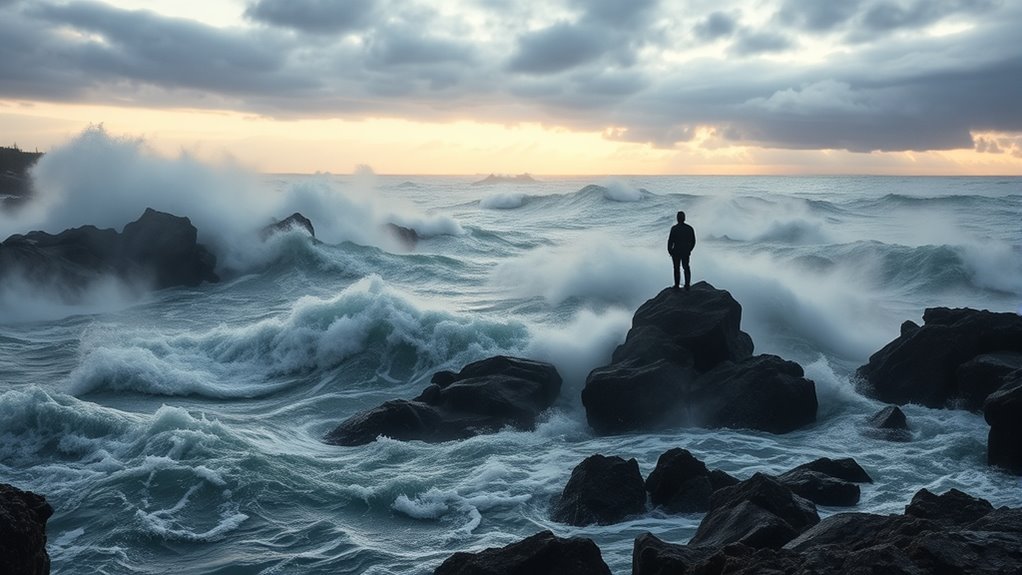
Have you ever wondered how ancient civilizations explained the origins of the world’s destructive floods? Across different cultures, stories of catastrophic deluges have persisted for thousands of years, shaping myths and beliefs about divine anger, renewal, and human hubris. These ancient flood legends often share striking similarities, such as a righteous survivor or a chosen few who escape the rising waters. But do these stories hold any truth beyond myth? Could there be archaeological evidence supporting these ancient accounts?
Ancient flood legends are remarkably widespread, spanning Mesopotamian, Greek, Indian, Chinese, and Mesoamerican cultures. For example, the Epic of Gilgamesh from Mesopotamia recounts a great flood sent by gods to punish humanity, with Utnapishtim surviving by building a boat. Similarly, Greek mythology tells of Deucalion and Pyrrha, who survived a divine flood to repopulate the earth. These stories often serve to explain natural phenomena or to impart moral lessons, but many researchers have long speculated whether they could be rooted in real historical events.
Archaeological evidence plays an essential role in this debate. Over the past century, excavations in the ancient city of Shuruppak (modern-day Fara) and other sites in Mesopotamia have uncovered layers of silt and flood deposits that date back thousands of years. Some researchers interpret these layers as evidence of ancient floods that might have inspired the stories. Similarly, discoveries of submerged settlements and ancient river channels suggest that significant flooding events could have devastated early civilizations, leaving lasting impressions on collective memory and oral storytelling.
While some scholars remain cautious, arguing that these flood legends are allegorical or mythic rather than factual, others see a compelling link between archaeological findings and ancient stories. Certain geological studies identify periods of intense flooding in the Middle East that align with the timelines of these legends. These findings hint that catastrophic floods could have occurred, possibly inspired by natural events like the sudden overflow of rivers, tsunamis, or climate shifts. Additionally, the presence of climate change evidence in geological records supports the idea that dramatic environmental shifts might have contributed to such events.
In essence, the convergence of ancient flood legends and archaeological evidence invites us to think that these stories might be more than mere myth. They could reflect real, albeit extreme, natural disasters that early humans witnessed and remembered. Whether you see them as myth or history, these stories remind us of humanity’s enduring encounter with nature’s power. They serve as a testament to how ancient civilizations sought to understand, explain, and perhaps even find meaning in the devastating floods that shaped their worlds.
Frequently Asked Questions
How Do Different Cultures Interpret Flood Myths Worldwide?
You see that different cultures interpret flood myths through unique cultural narratives that reflect their values and environment. These myths often carry symbolic meanings, representing purification, renewal, or divine punishment. By exploring these stories, you understand how societies use flood myths to convey moral lessons and explain natural disasters, highlighting universal themes of destruction and rebirth. Each culture’s interpretation enriches your understanding of humanity’s shared history with natural forces.
What Archaeological Evidence Supports a Historical Flood Event?
You can find archaeological evidence for a historical flood event in sedimentary layers that show sudden, widespread deposits, indicating a massive influx of water. Excavations of ancient settlements often reveal signs of destruction or abandonment consistent with flooding. These layers, coupled with geological data, suggest a significant deluge impacted early human communities, supporting the idea that some flood myths may stem from real, catastrophic events in ancient history.
Could Climate Change Have Caused Ancient Deluges?
Could climate change really trigger ancient deluges? Absolutely. Environmental triggers like rapid sea level rise, intense storms, or melting glaciers could cause catastrophic floods. Climate impact in prehistoric times might have led to massive deluges, shaping myths like Deucalion’s flood. These environmental factors caused extreme weather and water surges, creating the perfect conditions for historic or mythic floods. So, climate change’s historical role is more significant than we often realize.
How Do Scientists Distinguish Myth From Fact in Flood Stories?
You can distinguish myth from fact in flood stories by examining geological evidence that shows actual ancient floods, like sediment layers or erosion patterns. Scientists also analyze cultural symbolism, noting how flood myths reflect shared human experiences or environmental events. When geological evidence aligns with cultural stories, it suggests real events influenced myth-making. If not, stories might be symbolic, emphasizing moral lessons rather than historical fact.
Are There Modern Parallels to the Myth of Deucalion’s Flood?
You might wonder if modern events echo Deucalion’s flood. Climate models reveal rising sea levels and catastrophic storms, creating parallels to ancient myths. These stories serve as myth analysis tools, warning us of potential future deluges. As climate change accelerates, you realize that today’s floods could be humanity’s modern myth, a stark reminder of nature’s power and our fragile existence amidst rising waters.
Conclusion
So, here you are, pondering whether Deucalion’s flood was just a myth or a glimpse into ancient reality. Ironically, as much as we dismiss these stories as legends, evidence of ancient floods keeps surfacing—hinting that perhaps, the deluge wasn’t just myth after all. Maybe those mythical waters weren’t so mythical, and in ignoring them, we’re missing the chance to understand a past that’s desperately trying to tell us something.
